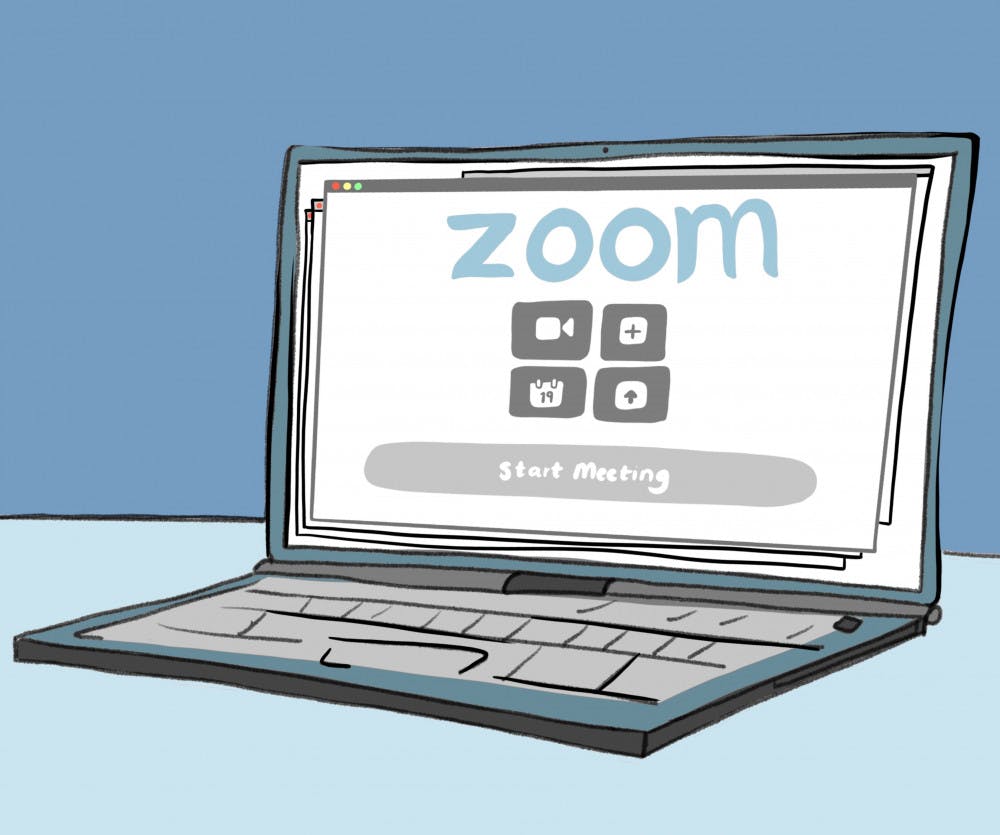Several Student Activities Fair meetings were interrupted last week by an anonymous participant who joined organizations’ virtual booths and disrupted their meetings in ways ranging from impersonating a campus administrator to making transphobic comments.
The person joined organizations’ Zoom rooms without their camera on, used a fake name — usually pretending to be an interested student — and asked questions about the organization from the representatives on the call. After a few minutes, however, they would say or do something to disturb the meeting.
None of the student organizations impacted could find an email address associated with the participant in the meeting report. However, administrators of an organization’s Zoom plan may be able to check more detailed reports from meetings, including the IP address of devices that were used to access the meeting.
It is possible that the incidents could have involved multiple disruptors; however, the students interviewed for this article all described a similar voice and pattern of behavior across different organizations and days of the Activities Fair.
Lily Shannon ’23 was running the Women’s Rugby Club meeting when the person entered the organization’s Zoom room. She and her co-host answered questions from the individual for several minutes, but the questions grew increasingly strange until the person made several transphobic comments and left, Shannon said.
The team’s board members spoke about the incident later and decided not to share details of what happened to avoid giving the person the attention they were likely seeking.
“Suffice it to say, there were transphobic comments made, and they were not cool,” Shannon said. “Our team wants to foster a sense of community and inclusivity, and we want all of our players to know that they are welcomed and valued on our team, so it was just really horrible.”
Shannon and her co-host are planning to contact the Community Bias Response Team (CBRT), Middlebury’s group of staff, faculty, and students who address incidents of bias. They hope that the CBRT can help them address the issue and find resources for investigating the incident, including — if possible — identifying the culprit.
Zoom has a setting that hosts can enable to allow only authenticated users — those who have signed in with their email address — to access a meeting, but it is not a default setting when meetings are created, and many Activities Fair meetings did not require users to be logged in. However, access to the spreadsheet with the time, date and link for Activities Fair booths required a Middlebury email address.
In past years, the Activities Fair has taken place in person, where students can visit tables set up by different student organizations and ask questions face to face. However, Covid-19 restrictions shifted the fair online for both the fall and spring semesters, leaving meetings vulnerable to anonymous online trolling.
“Zoom bombing,” a phenomenon where uninvited participants disrupt video-conference calls — often by screen-sharing pornographic or offensive content — has become more common as more events take place through teleconferencing software during the pandemic.
Middlebury’s Information Technology Services (ITS) lists security recommendations for Zoom meetings on their page, along with answers to other frequently asked questions about the technology. ITS suggests that public meetings be held as webinars where attendees cannot unmute themselves or share their screens, although this would limit the face-to-face interaction that is typical for the Activities Fair.
ITS also advises against posting Zoom links with passwords publicly. The spreadsheet with the schedule for Activities Fair booths included the Zoom links and passwords for each organization so interested students could participate in informal, drop-in meetings reminiscent of past fairs. At the fall Activities Fair, links and passwords were available in the same format but there were no reported incidents of Zoom bombing or other issues.
Other calls were not confronted with the same offensive comments as the rugby team but still had meetings disrupted by the anonymous person. Julia Goyan ’22, president of the women’s crew team, was in the team’s virtual booth when the person joined.
“The person started talking and sounded sort of strange, and was asking strange questions… and we ultimately removed him when we realized it was maybe not a student — or maybe not someone who should be in the call at least,” Goyan said.
The person eventually asked Goyan if she was single, and this alongside other strange questions and the fact that the person had their camera off led the hosts to remove them from the meeting.
At the Middlebury College Organic Farm’s Zoom meeting, someone logged in without a name or camera on and started making jokes, according to Clark Devoto ’23, who was running the meeting.
“I could tell that he was sort of trying to prank me. It wasn’t very tasteful what he said, but personally, I didn’t mind too much,” Devoto said. “He just jumped right in and said, you know, ‘Is this a hippie club?’ and then kept joking.”
Grace Hering ’21.5 was at an Activities Fair meeting for The Mill on Wednesday and the college’s Sailing Club on Thursday when the anonymous person joined. At The Mill, Hering and her co-host were explaining what the social house did when the person interrupted them and told them they were a campus administrator.
“I started laughing because the guy did not sound like a campus administrator, and obviously no campus administrator would come on a Zoom with just the name Ryan and start questioning us about our college-sponsored events,” Hering said.
Hering said the person seemed surprised when they said The Mill hosted parties that are school-sponsored and monitored by PubSafe, which cast further doubt on the person identifying themselves as an administrator.
At the Sailing Club’s Zoom meeting on Thursday, a person joined with their camera off and started asking questions. Hering and her co-host from The Mill were both on the call for sailing and suspected it might have been the same person, but decided to give them the benefit of the doubt and answered their questions about the team in case it was an interested student.
Representatives for the team screen-shared an introductory “hype” video on which the anonymous participant drew a phallic sketch using Zoom’s annotation feature.
“Obviously we can all see it’s him. I don’t feel like he had a very good conception of how Zoom worked, because he immediately goes ‘Oh, who’s doing that?’ and we all know he is,” Hering said.
The person rejoined the team’s Zoom room shortly after the Activities Fair had ended, while team members were still chatting on the call. Hering and others on the call spoke with him for a few minutes, where he said the sailing team had exhibited the least animosity of the groups he had visited and told the team he was trying to elicit reactions from people. He also asked Hering if she was single.
“I’m still not entirely sure that he was a Middlebury student. He seemed to know what baby Febs were, but he might have gotten that from all the clubs asking him if he was a baby Feb,” Hering said.
He referred back to seeing Hering at The Mill’s meeting the previous day, and she told him they had tried to find his email address after he left The Mill’s Zoom room.
“He said he didn’t know that people could look up emails after they left in Zoom activity logs, but that he had just been clicking on emails and had purposefully not logged on with his email,” Hering said.
Several other events of a similar nature occurred, in which the same student presumably entered Zoom rooms and asked strange questions or made offensive comments. The school has yet to address the incident publicly.

Tony Sjodin ’23 is a managing editor.
He previously served as community council correspondent, senior writer, news editor and senior news editor.
Sjodin is majoring in political science with a focus on international and comparative politics. He previously held internships with the Appalachian Mountain Club's Outdoor Magazine, political campaigns in Massachusetts and Vermont, and the U.S. Embassy in Costa Rica's Environmental Hub. Outside of class, he leads kayaking and hiking trips with the Middlebury Mountain Club.




